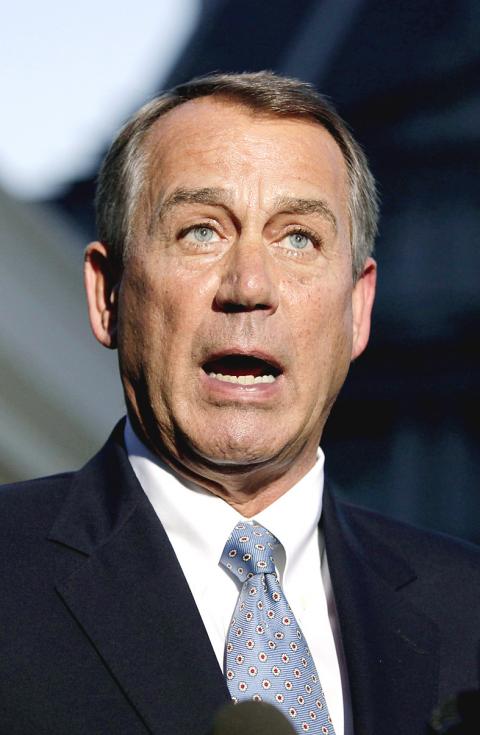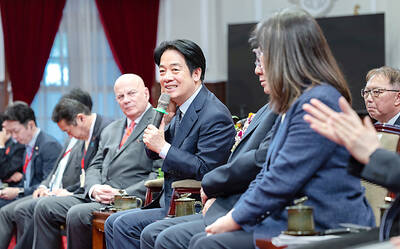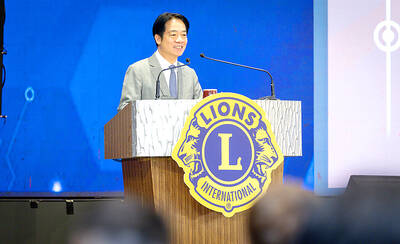The US limped into day three of a government shutdown yesterday with US President Barack Obama warning markets that the crisis could trigger a catastrophic US debt default.
Obama met with top Republican leaders for an hour on Wednesday, but the talks failed to end the crisis that has sent hundreds of thousands of government workers home, and shut museum sites and national parks throughout the country.
Conservative Republicans want to dismantle or amend Obama’s healthcare law as a condition for approving stop-gap funding for the new fiscal year, which began on Tuesday. The president is refusing to tinker with the legislation, his signature healthcare reform bill widely known as “Obamacare.”

Photo: Reuters
Both sides accused the other of refusing to negotiate and there is no end in sight to the latest crisis to hit bitterly divided Washington.
Heightening tensions, Obama sent Wall Street a blunt warning that the political crisis that has paralyzed the US federal government could yet trigger a catastrophic debt default, but when he met with Republican House of Representatives Speaker John Boehner and Senate minority leader Mitch McConnell, there was no sign of a breakthrough. Hundreds of thousands of federal workers are staying home, museums and national parks are shut, much scientific research is on hold and the shutdown is now threatening sluggish economic growth.
“The president reiterated one more time that he will not negotiate,” Boehner said, emerging empty-handed into a warm Washington night to address reporters after the West Wing talks.
On that point at least, the two sides agreed.
Obama said in an interview with CNBC that he would not negotiate on budget matters until Republicans had passed a bill to reopen the government and raise the US$16.7 trillion US debt ceiling.
The cap must be raised within two weeks or Washington could default on its government debt and payments for the first time, a result that could hurt the credit rating of the world’s largest economy.
Democratic Senate majority leader Harry Reid emerged from the talks complaining about Boehner’s attitude and vowing not to allow the healthcare law to be overturned.
In his interview, Obama challenged his opponents to directly address the financial community.
Obama was asked whether Washington was simply gripped by just the latest in a series of political and fiscal crises which reliably get solved at the last minute.
In unusually frank comments on issues that could sway markets, Obama warned that investors should be worried.
“This time’s different. I think they should be concerned,” Obama said. “When you have a situation in which a faction is willing potentially to default on US government obligations, then we are in trouble.”
Obama said he would not negotiate until lawmakers pass a temporary financing bill and raise the debt ceiling, but after that he would be “prepared to have a reasonable, civil negotiation around a whole slew of issues.”
The US president warned it would set a terrible precedent to allow lawmakers of any party to hold a White House to ransom over the government’s borrowing limit.

Two US House of Representatives committees yesterday condemned China’s attempt to orchestrate a crash involving Vice President Hsiao Bi-khim’s (蕭美琴) car when she visited the Czech Republic last year as vice president-elect. Czech local media in March last year reported that a Chinese diplomat had run a red light while following Hsiao’s car from the airport, and Czech intelligence last week told local media that Chinese diplomats and agents had also planned to stage a demonstrative car collision. Hsiao on Saturday shared a Reuters news report on the incident through her account on social media platform X and wrote: “I

‘BUILDING PARTNERSHIPS’: The US military’s aim is to continue to make any potential Chinese invasion more difficult than it already is, US General Ronald Clark said The likelihood of China invading Taiwan without contest is “very, very small” because the Taiwan Strait is under constant surveillance by multiple countries, a US general has said. General Ronald Clark, commanding officer of US Army Pacific (USARPAC), the US Army’s largest service component command, made the remarks during a dialogue hosted on Friday by Washington-based think tank the Center for Strategic and International Studies. Asked by the event host what the Chinese military has learned from its US counterpart over the years, Clark said that the first lesson is that the skill and will of US service members are “unmatched.” The second

STANDING TOGETHER: Amid China’s increasingly aggressive activities, nations must join forces in detecting and dealing with incursions, a Taiwanese official said Two senior Philippine officials and one former official yesterday attended the Taiwan International Ocean Forum in Taipei, the first high-level visit since the Philippines in April lifted a ban on such travel to Taiwan. The Ocean Affairs Council hosted the two-day event at the National Taiwan University Hospital International Convention Center. Philippine Navy spokesman Rear Admiral Roy Vincent Trinidad, Coast Guard spokesman Grand Commodore Jay Tarriela and former Philippine Presidential Communications Office assistant secretary Michel del Rosario participated in the forum. More than 100 officials, experts and entrepreneurs from 15 nations participated in the forum, which included discussions on countering China’s hybrid warfare

MORE DEMOCRACY: The only solution to Taiwan’s current democratic issues involves more democracy, including Constitutional Court rulings and citizens exercising their civil rights , Lai said The People’s Republic of China (PRC) is not the “motherland” of the Republic of China (ROC) and has never owned Taiwan, President William Lai (賴清德) said yesterday. The speech was the third in a series of 10 that Lai is scheduled to deliver across Taiwan. Taiwan is facing external threats from China, Lai said at a Lions Clubs International banquet in Hsinchu. For example, on June 21 the army detected 12 Chinese aircraft, eight of which entered Taiwanese waters, as well as six Chinese warships that remained in the waters around Taiwan, he said. Beyond military and political intimidation, Taiwan